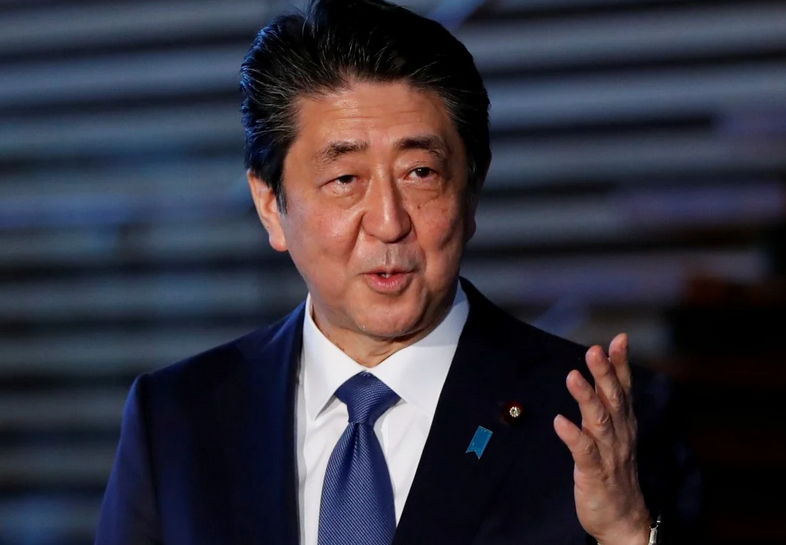Tokyo – Japan is to declare a state of emergency in Tokyo and six other prefectures as early as Tuesday in a bid to stop the coronavirus, Prime Minister Shinzo Abe said, with the government preparing a stimulus package to soften the economic blow.
Abe said the stimulus package worth 108 trillion yen (nearly US$1 trillion) and equivalent to 20 per cent of Japan’s GDP will be rolled out this week. It surpasses the 60 trillion yen (US$550 billion) package recommended by Abe’s ruling party last week.
The package will include cash handouts worth 6 trillion yen for households and small businesses hit by the virus and offers businesses deferrals on tax and social service costs worth 26 trillion yen, Abe said. The first phase aims to stop job losses and bankruptcies, while a second round of aid, after the virus is contained, will try to support an economic recovery.
“We hope to declare a state of emergency as early as tomorrow after listening to the opinions of the advisory panel,” Abe told reporters on Monday evening.
“We’re currently seeing rapid increases of new infections particularly in urban areas like Tokyo and Osaka,” he said. “Considering that medical institutions are facing a critical situation, I have received opinions that the government should prepare to declare a state of emergency.”
More than 3,500 people have tested positive for the coronavirus in Japan and 85 have died – not a huge outbreak compared with some hotspots, but the numbers keep rising with particular alarm over the spread in Tokyo, which has more than 1,000 cases, including 83 new ones on Monday.
An emergency, which Abe said would last about a month, also includes Kanagawa, Saitama, Chiba, Hyogo and Fukuoka prefectures. It will give governors authority to call on people to stay at home and businesses to close, but not to order the kind of lockdowns seen in other countries. In most cases, there are no penalties for ignoring requests, and enforcement will rely more on peer pressure and respect for authority.
Officials can order the cancellation of events, restrict the use of facilities such as schools and cinemas, and appropriate land or buildings for temporary medical facilities. Public transport will continue to operate, Abe said.
The move also enables local governments to take steps such as controlling prices of daily essentials, providing loans through government-related financial institutions, and making compulsory purchases of food and medicines.
Pressure had been mounting on the government to take the step although Abe has voiced concern about being too hasty, given the restrictions on movement and businesses that would ensue.
An emergency would appear to have public support. In a poll published on Monday by JNN, run by broadcaster TBS, 80 per cent of those surveyed said Abe should declare it while 12 per cent said it was not necessary. His approval rating fell by 5.7 points from last month to 43.2 per cent, the survey showed.
Kenji Shibuya, director of the Institute for Public Health at King’s College, London, said the emergency was too late given the explosive increase in cases in Tokyo. “It should have been declared by April 1 at the latest,” he said.
Sounding alarm over the high rate of cases that could not be traced, Tokyo Governor Yuriko Koike indicated last week that she would favour a state of emergency as a way to help her urge residents to adhere to stronger social-distancing measures.
An expert on
the government’s coronavirus panel said Japan could avoid an explosive rise by
reducing person-to-person contact by 80 per cent.
A state of emergency can stay in place for as long as two years and can be
extended by as much as one more year, under a law updated in March. The prime
minister can make the call when the spread of the infection poses a “grave
danger” to lives and could have a big impact on the economy.
Economy
Minister Yasutoshi Nishimura called for calm saying there was no need for
people in designated prefectures to flee to other regions, which could spread
infections, NHK reported.
While Japan’s coronavirus epidemic is dwarfed by the 335,000 infections and
more than 9,500 deaths in the United States alone, experts worry a sudden surge
could overwhelm Japan’s medical system.
Abe must seek formal advice from a panel of experts before deciding to go ahead and declare the emergency.
Governors in Tokyo and elsewhere have asked citizens to stay home on weekends, avoid crowds and evening outings, and work from home. That has had some effect, but not as much as many experts said was needed. (Reuters)

